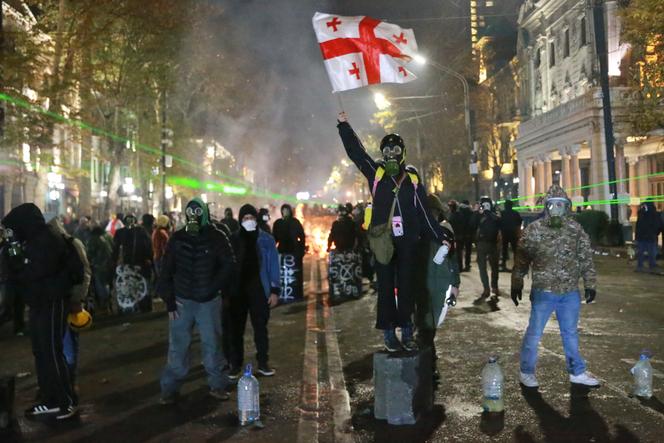


It was past 3 am in Tbilisi and for the seventh consecutive night, the city was not sleeping. On Wednesday, December 4, the streets were alive with demonstrators draped in Georgian and European flags. Some wore ski or swimming goggles over their eyes, while the better-equipped wore gas masks. The sounds of whistles blended with vuvuzelas and the detonation of fireworks, shot into the air by protesters or at the law enforcement officers deployed en masse outside Parliament.
For the first time in 30 years, demonstrators in Tbilisi erected barricades in the streets. Cries of joy and anger erupted. "Where are we going? To Europe!" "Sakartvelo! Sakartvelo!" ("Georgia! Georgia!"). Groups warmed themselves around makeshift fires on the pavement. Police tried to disperse the crowd with water cannons and tear gas. A wounded man was hastily evacuated by volunteers. Fingers were pointed at the riot police. A group sang: "We defend peace, long live Georgia!"
The city has been in turmoil since November 28 when the government announced the suspension of its European Union membership process until 2028. Demonstrators are also denouncing the "rigged" results of the October 26 parliamentary elections, which gave victory to the ruling Georgian Dream party. Neither the opposition nor the president, Salome Zourabichvili, recognize the election and have denounced "massive fraud." The protest movement has spread to 42 cities across the country. Hundreds of civil servants, thousands of teachers, bank employees, hospital staff and priests have condemned the government's decision.
In Tbilisi, 27-year-old Luka Patashuri has been taking to the streets every evening. "This government has falsified the elections and is leading us toward Russia," said the theater actor who had cobbled together a shield from a steel can. "We want new, free and democratic elections." An ambulance whizzed by a burnt-out garbage can. "This is an existential moment in Georgia's history. The more pressure they put on us, the more we'll keep going. The new generation, born in freedom, is even stronger," he said. "Nothing can break them." Thirty years earlier, it was his mother who took to the streets at an anti-Soviet demonstration on April 9, 1989. She now supports her son, unlike his father, a Georgian Dream supporter with whom Luka has broken off contact.
The crowd is made up of all generations. David Tchirkhadze, 49, hard hat on his head, had come with some friends. "We're seeing an unprecedented wave," he said. "We'll go to Europe or to hell. I lived through the Soviet Union, so I know what it's like."
You have 58.11% of this article left to read. The rest is for subscribers only.
